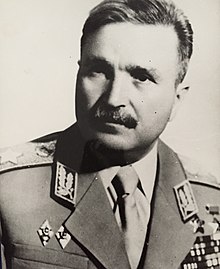Dobri Dzhurov
Army General Dobri Dzhurov | |
|---|---|
| Добри Джуров | |
 | |
| Minister of People's Defense of Bulgaria | |
| In office 17 March 1962 – 22 August 1990 | |
| President | Todor Zhivkov |
| Preceded by | Ivan Mihailov |
| Succeeded by | Yordan Mutafchiev |
| Personal details | |
| Born | (1916-01-05)5 January 1916 Lovech Province, Kingdom of Bulgaria |
| Died | 17 June 2002(2002-06-17) (aged 86) Sofia, Bulgaria |
| Citizenship | People's Republic of Bulgaria |
| Political party | Bulgarian Communist Party |
| Spouse | Elena Dzhurovа |
| Military service | |
| Allegiance |  People's Republic of Bulgaria People's Republic of Bulgaria |
| Branch/service |  Bulgarian People's Army Bulgarian People's Army |
| Years of service | 1939–1990 |
| Rank | Army General |
Dobri Marinov Dzhurov (Bulgarian: Добри Маринов Джуров; 5 January 1916 – 17 June 2002) was a Bulgarian politician and military leader. He was the last Defense Minister of the People's Republic of Bulgaria from 1962 to 1990.[1][2]
Biography
He participated in the resistance movement during the Second World War. He was the commander of a guerrilla brigade. After the communist coup in September 1944, he began work at the Ministry of the Interior and later became an officer of the Bulgarian Army. He became the Minister of People's Defense of Bulgaria in 1962. He was responsible for Bulgaria's participation in the invasion of Czechoslovakia by Warsaw Pact troops in 1968. He had been a full member of the CPB since 1974.
Role in the downfall of Zhivkov
Dzhurov played a key role in the ousting of longtime Communist leader Todor Zhivkov in December 1989. Although he and Zhivkov's relationship dated back to the resistance, he had grown increasingly disgusted with Zhivkov's behavior. When he lent his support to the plot to oust Zhivkov, he was given the task of ensuring that Zhivkov would have no room to manoeuvre.[3][4] On 9 November, a day before a scheduled Politburo meeting, Dzhurov advised Zhivkov to resign. He warned Zhivkov that the Politburo had lost confidence in him, and there were enough votes to remove him. Zhivkov was caught unaware and tried to marshal support, to no avail.[4]
Just before the meeting the next day, Dzhurov gave Zhivkov an ultimatum—unless he stepped down, the Politburo would not only vote to remove him, but have him executed. Zhivkov realized he was at the end of his tether, and resigned.[4]
Personal life
He met his wife Elena in a guerrilla group. They were married for 60 years. They have three children:
- Chavdar Dzhurov, was a military pilot who in 1965 set a record of the highest night parachute jump.
- Spartak Dzhurov
- Aksiniya Dzhurova, a scientist who was named after Dzhurov older sister, who died in 1941.[5]
References
- ^ "Нар. Республики Болгарии, генерал армии (1962)".
- ^ "а с марта 1962 министр Нар. обороны. Д. — один из".
- ^ Thompson, Wayne C. (2008). The World Today Series: Nordic, Central and Southeastern Europe 2008. Harpers Ferry, West Virginia: Stryker-Post Publications. ISBN 978-1-887985-95-6.
- ^ a b c Sebetsyen, Victor (2009). Revolution 1989: The Fall of the Soviet Empire. New York City: Pantheon Books. ISBN 978-0-375-42532-5.
- ^ Чл.-кор. проф. д.изк.н. Аксиния Джурова: Имали сме и по-тежки изпитания от прехода и сме излизали възродени - 24chasa.bg












